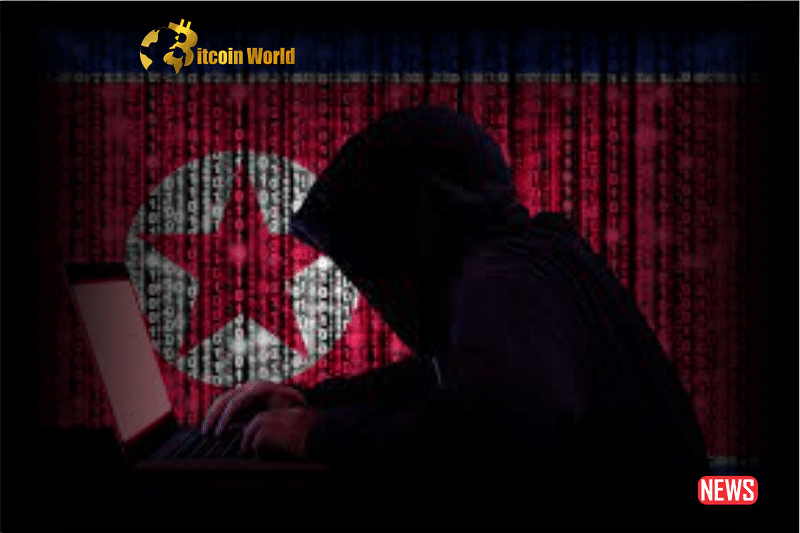Ever wondered where a chunk of the world’s stolen cryptocurrency ends up? A significant portion is reportedly linked to North Korean hackers. Hold on to your digital wallets, because a recent report from blockchain intelligence firm TRM Labs reveals that these cyber actors have pilfered over $200 million in cryptocurrency in 2023 alone. That’s a whopping 20% of all crypto stolen this year! It’s a stark reminder that the cyber landscape is a constantly shifting battlefield, and understanding these threats is crucial for everyone involved in the digital asset space.
The Big Picture: How Much Crypto is Vanishing?
While $200 million in a single year is eye-watering, it’s part of a larger, even more concerning trend. Over the past five years, cybercriminals have managed to snatch more than $2 billion in cryptocurrency. Think about that for a moment – that’s a staggering amount of wealth disappearing into the digital ether. Interestingly, TRM Labs highlights that 2022 was an even bigger year for these thefts, with hackers making off with over $800 million. A major contributor to this peak was the targeting of Decentralized Finance (DeFi) protocols.
Remember the Ronin Bridge Attack?
A prime example of the audacity and scale of these attacks is the infamous Ronin Bridge hack in March of last year. This single incident resulted in the theft of a staggering $625 million! It served as a wake-up call, underscoring the vulnerabilities within the crypto ecosystem and the sophisticated capabilities of these cyber adversaries.
How Do They Do It? Unmasking the Hackers’ Tactics
These aren’t your run-of-the-mill hackers operating from their basements. The report indicates that both state-sponsored and independent North Korean hacking groups employ increasingly sophisticated techniques to not only steal cryptocurrency but also to launder their ill-gotten gains. Think of it as a digital shell game.
- Chain Hopping: Moving stolen funds across multiple different blockchains to make tracking incredibly difficult.
- Mixers: Utilizing services that obfuscate the origin and destination of cryptocurrency transactions by mixing them with other users’ funds.
To further muddy the waters, these hackers often cash out their crypto through exchanges that have less stringent Know Your Customer (KYC) and Anti-Money Laundering (AML) controls. It’s a constant game of cat and mouse between the hackers and the authorities trying to track them down.
Tornado Cash Out, Sinbad In: A Shift in Laundering Preferences?
The cyber landscape is dynamic, and so are the tactics of these hackers. Following sanctions imposed on the popular Tornado Cash Ethereum mixer, there’s been a noticeable shift towards the Sinbad mixing service. This suggests that when one door closes, these actors quickly find another way to operate, highlighting the need for continuous adaptation in cybersecurity measures.
The Atomic Wallet Heist: A Case Study
June of this year saw a significant incident where hackers targeted users of the Atomic Wallet, making off with approximately $100 million in various cryptocurrencies. TRM Labs’ investigation revealed a clear pattern:
- Stolen Ethereum was immediately sent to new addresses controlled by the hackers.
- These funds were then funneled through mixing services to obscure the transaction trail.
- The mixed funds were likely converted into other cryptocurrencies or eventually cashed out.
How Can We Protect Ourselves? Actionable Insights from the Experts
So, what can be done to combat this growing threat? TRM Labs, with its team of experts including former members of law enforcement agencies like INTERPOL, emphasizes the importance of robust cybersecurity measures. Here are some key takeaways:
| Security Measure | Benefit |
|---|---|
| Hardware Security Modules (HSMs) | Provide a highly secure environment for storing cryptographic keys, making them much harder to access remotely. |
| Allowlisting of Addresses | Restricts cryptocurrency transfers to only pre-approved addresses, limiting the damage from unauthorized access. |
| Secure Offline Storage (Cold Storage) | Storing cryptographic keys and passphrases offline significantly reduces the risk of online theft. |
The Ongoing Battle: Staying One Step Ahead
The reality is that as long as cryptocurrency holds significant value, it will remain a target for malicious actors. The success of North Korean hackers in the crypto sphere underscores the constant need for vigilance and the reinforcement of security protocols. This intricate dance between cybercriminals and cybersecurity experts is an ongoing evolution, demanding a proactive and resilient approach to safeguarding our digital assets. Staying informed, adopting strong security practices, and supporting initiatives that enhance blockchain security are crucial steps in navigating this ever-changing landscape.
Disclaimer: The information provided is not trading advice, Bitcoinworld.co.in holds no liability for any investments made based on the information provided on this page. We strongly recommend independent research and/or consultation with a qualified professional before making any investment decisions.




